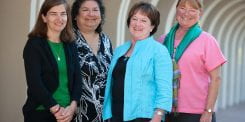The good fight
Patients battling cancer have a powerful ally in Dr. Wendy Brewster

Some gynecologic cancers are like stealth bombs. Difficult to detect. Destructive. At times, fatal. They are among the most insidious of malignancies. But they have a worthy opponent in UCI surgical oncologist and epidemiologist Wendy Brewster, M.D., Ph.D. ’00.
“Often, patients with early stage gynecologic cancers – ovarian cancer, for example – experience symptoms so vague that they delay seeking attention, giving the disease opportunity to invade other organs,” says Brewster. Her position with the Division of Gynecologic Oncology makes her part of a nationally renowned resource dedicated to treating women with early stage or invasive cancers (UCI Medical Center is among the nation’s top health care institutions for gynecology, according to U.S. News & World Report).
“We’re continually seeking better methods for early detection in certain populations,” says Brewster, “which may allow for more successful treatment. For example, current ovarian cancer studies explore the feasibility of measuring the blood for tumor markers produced by ovarian cancer cells. We’re also studying data related to genetics and lifestyle factors, such as a history of smoking or oral contraceptives. What we do know: early detection that targets characteristics in at-risk populations will influence prevention and, ultimately, a cure.”
Brewster is passionate about sharing the knowledge upon which her medical career has been built. An assistant professor of obstetrics and gynecology and epidemiology, she is a prolific contributor to medical publications and frequent guest speaker at conferences around the country. She also chairs the Cancer Prevention and Control Committee, Subcommittee Disparities/Epidemiology for the Gynecologic Oncology Group, a national organization dedicated to furthering clinical research and cancer trials.
It’s a daunting schedule – and ideal for Brewster, who explains, “I’ve always loved the order, information and logic science offers.” This lifelong affinity for all things scientific and an inherent fascination for research and discovery made medicine an obvious career choice.
Brewster came to UCI via a winding route that carried her from her childhood home in Guyana to Rutgers University for undergraduate work and on to UCLA, where she received her medical degree. Initially torn between general surgery and gynecologic oncology, Brewster says, “I chose gynecologic oncology for the opportunity to care for my patients through their entire course of treatment and until cure is achieved.”
During the second year of her fellowship at UCI Medical Center, while conducting research on indicators in breast cancer survivors who develop a second primary cancer, she decided to take the unusual step of pursuing an epidemiology doctorate, which she received from UCI’s School of Social Ecology.
“I realized I wanted to do something more with all that research,” she explains. “Completing my doctorate was a logical progression.”
Today, her research reflects her conviction that early detection is vital to prevention. Recently, she led a National Cancer Institute-funded trial in which low-income women who participated in a single-visit cervical cancer screening and treatment program demonstrated an enhanced rate of treatment and 12-month follow-up (compared to conventional care methods). Brewster, who currently oversees six research trials, also is the recipient of an NCI K07 Award to study the correlation of estrogen and metabolizing factors in the development of ovarian cancer.
Outside her lab, Brewster’s focus moves beyond data. Her patients’ ages vary: young women confronted with diagnoses that, at best, might remove any chance of childbearing while subjecting them to a punishing round of drug and surgical intervention, and older women who must decide how much of their final months of life they wish to spend in treatment. Always challenging and sometimes heartbreaking, there is, adds Brewster, an element of humor and irony in treating these women.
Explains Brewster, “My patients are women first, and patients second. As such, our relationship will always have a unique dynamic. My patients are often so ill, waiting for yet more bad news – and their first comments to me are not about their health but rather about my current hairstyle or the color of my blouse. For a few moments, we’re simply two women talking – and that’s a component of the doctor-patient relationship that isn’t
learned in school.”
She reflects a moment, then continues.
“It’s the patients who are the real heroes. They deal with the pain of their illnesses with such grace. I try to give my patients the best of what they want. They, in turn, put my life in focus.”
“Wendy is truly a woman for all seasons,” says Dr. Philip J. Di Saia, Dorothy Marsh Chair in Reproductive Biology and chief of gynecology and gynecologic oncology. “I don’t know of any other surgical oncologist in the nation who has a doctorate in epidemiology. She is a unique scientist, an excellent surgeon, a skilled clinician and a well-liked woman by both her peers and patients.”
Di Saia, who oversees funding for his team’s research efforts, notes that Brewster’s studies of cancer within subpopulations significantly contribute to more effective treatment for at-risk groups.
“Targeting risk factors in certain groups allows us to disburse our funds more judiciously,” he says. “In an ideal society, we would have screening and treatment for everyone. Efforts such as Wendy’s enable us to deliver the next best thing.”
Brewster has a tough battle before her: Breast cancer affects 189,000 women annually, ovarian cancer 25,000 annually – statistics that mean fewer grant dollars designated for research in gynecologic malignancies. With the funding for her NCI K07 award ending in 2007, Brewster must obtain the financial support that will enable her to carry this work forward, or, as she describes, “advance the science.”
“We have the preliminary information we need to begin data analysis,” she says. “Now, we must make what we’ve accomplished so far evolve into something greater – put the data into genetics and, ultimately, pinpoint at-risk women before any malignancy develops.”
Let the battle begin.

